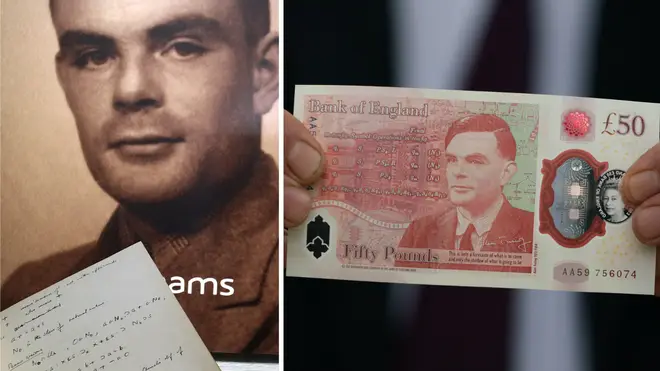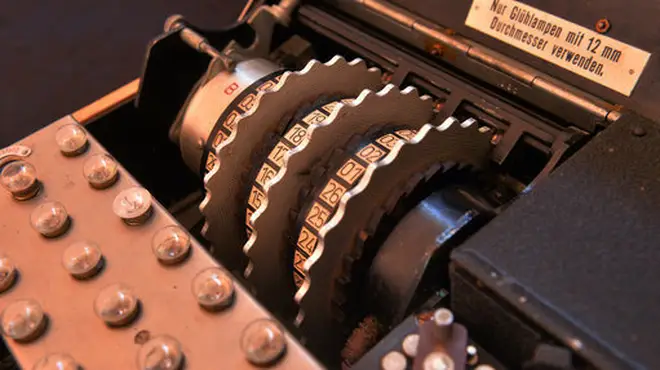
Paul Brand 10am - 12pm
23 June 2021, 10:07 | Updated: 23 June 2021, 10:20

The Bank of England has today issued a new £50 bank note featuring mathematician and computer scientist, Alan Turing.
The newly-designed £50 note has entered circulation today, coinciding with what would have been Alan Turing's birthday.
From October next year, paper £50 and £20 notes will no longer be accepted in shops, but they can be exchanged at the Post Office. You can also swap old £50 notes at the Bank of England for their face value.
Here, we take a look at the inspiring life of Alan Turing, the man who cracked Enigma during WW2 and played an integral part in helping the Allies and Britain claim victory.
Born on 23 June, 1912, in Maida Vale, London, Alan Turing was a mathematician and computer scientist who was educated at St Michael's, Hazelhurst Preparatory School and later Sherborne School in Dorset.
He went on to study mathematics at King's College, Cambridge, where he was awarded first-class honours.
Aged 22, Turing was elected a Fellow of King's College, following his dissertation - in which he proved the central limit theorem.
Later on, Turing was enlisted by the Government's Code and Cypher School at Bletchley Park in the Second World War, where he was tasked with breaking the code of German ciphers.
Enigma was a device used by German military to encode messages throughout World War II.
Before war broke out across Europe, however, Enigma was first broken under Polish mathematician, Marian Rejewski, in the early 1930s.
The Poles then handed over the information they had acquired to the British, who had set up the top-secret code-breaking unit, Ultra - which was headed up by Turing - at Bletchley Park, Buckinghamshire.
German authorities increased the level of security at the outbreak of the war, changing their cypher system daily.
Along with code-breaker Gordon Welchman, Turing was instrumental in breaking the code, developing a machine called the Bombe.
By the mid-1940s, German Air Force signals were being read at Bletchley, allowing the Ultra team to assist British military commanders in the war effort.
The Germans also shared the device with the Japanese, meaning British intelligence helped decipher messages about strategic developments in the Pacific, helping the Allies claim victory in the region.

During his time at Hut 8 in Bletchley Park, Turing became engaged to his colleague Joan Clarke.
Turing broke off the engagement shortly after, admitting to Clarke that he was homosexual.
In January 1952, aged 39, Alan Turing started a relationship with 19-year-old Arnold Murray.
Turing's home was then burgled on January 23, by someone connected to Murray.
The mathematician went to report the incident to Manchester police, but during questioning the topic of Turing's sexuality came up.
At the time, homosexual acts were outlawed across the UK, and so both men were charged with "gross indecency" under Section 11 of the Criminal Law Amendment Act of 1885.
Following a court trial, Turing was offered imprisonment or probation - the latter requiring him to undergo hormonal changes to reduce libido.
Turing accepted the probation terms and for the course of a year he was subjected to stilboestrol injections, a non-steroidal oestrogen treatment.
Owing to his conviction, Turing was barred from working with the Government Communications Headquarters (GCHQ), and was denied entry into the United States.
The cause of Turing's death has been disputed.
On June 8, 1954, Turing's housekeeper found him dead, aged 41.
A half-eaten apple was found by his bedside, and it was ruled that he had died of cyanide poisoning. The apple was never tested to see if it had been laced with poison.
The inquest also deduced that Turing had taken his own life.
It has been speculated that Apple designed its logo in honour of Alan Turing, though this has never been confirmed.
It wasn't until 2013 that Alan Turing was granted a posthumous pardon from Queen Elizabeth II.
Prior to the pardon, there had been a big Internet campaign and Gordon Brown, who was Prime Minister at the time, made an official public apology on behalf on the British Government in 2009.
In 2017, a new amnesty law was passed in the UK to pardon men who were cautioned or convicted under the legislation against homosexual acts.
However, in September 2019 it was reported that fewer than 200 men had had their convictions overturned.
Speaking to the BBC, Terry Stewart, a gay rights campaigner, commented on his own experience: "It just confirmed all my fears about so-called British justice.
"The attitude was they were two upstanding police officers protecting society from people like me."
Mr Stewart had previously been fined £20 and his criminal record meant he was unable to pursue a career in social work, but he is not eligible for the pardon.
Campaigners have also raised concerns over the bureaucratic system, saying it is off-putting and intimidating to those applying.